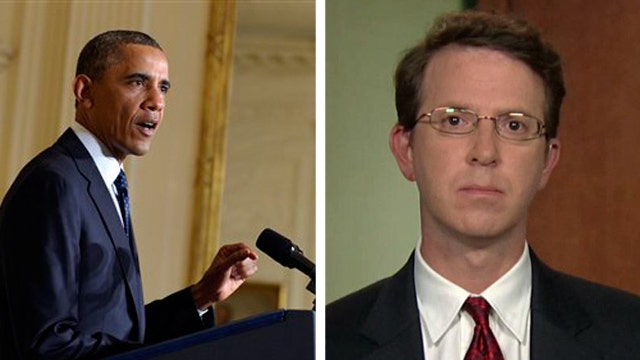This is a RUSH transcript from "The O'Reilly Factor," May 14, 2013. This copy may not be in its final form and may be updated
Watch "The O'Reilly Factor" weeknights at 8 p.m. and 11 p.m. ET!
O'REILLY: "Factor Follow-up Segment" tonight, the Obama
administration has indicted six federal employees for leaking classified
information, that's more than any other administration. What exactly is
going on?
Joining us from Washington Mark Zaid, an attorney who often represents
federal employees, who get caught up in this kind of stuff. So we have a
lot of covert operations around the world in the war on terror. And if the
press finds out about them people could die. I think we all know that.
And so is the Obama administration doing anything wrong here by upping
the prosecutions of the leakers?
MARK ZAID, NATIONAL SECURITY ATTORNEY: No. Not necessarily. I mean
leaks need to be prosecuted as you said my clients are often covert
intelligence officers, military members and a leak could actually cause
them harm could lead to their death.
O'REILLY: Yes.
ZAID: What's -- what's different since the Clinton administration and
the Bush administration both of which deplored leaks and wanted to go after
in fact many of these cases started in the investigative phase in the Bush
administration. What's changed is the evidence. This administration has
had access to the evidence mostly electronic -- e-mails, phone records like
with the AP, the recent AP issuance of a subpoena. And they have been able
to prosecute going forward.
O'REILLY: We're at the --
ZAID: Go ahead.
O'REILLY: -- you are saying that the high tech apparatus the Justice
Department now has enables them to ferret out these leakers a lot easier
than had been in the past.
ZAID: Than ever before.
O'REILLY: Ok.
ZAID: It's no longer the days of Woodward Bernstein meeting deep
throat at 2:00 o'clock in the morning in the parking garage.
(CROSSTALK)
O'REILLY: And you know what's interesting about that we had a guy who
working at Fox News recently convicted of a crime by taking information
from Fox News and giving it to Fox haters. And they tracked this guy down
like that because our security people here are very, very tech savvy. So
that's an interesting thing.
ZAID: Sure.
O'REILLY: All right.
ZAID: Well people think for example they'll use encrypted e-mail
which even perhaps the NSA can't break. Well that's not good when the
United States takes a subpoena, goes to the Internet provider and grabs all
the e-mails and hard copy.
O'REILLY: Right. It's hard to get around. So that's what's
happening. Now, the story breaks, 20 phone lines and again, they weren't
tapped.
ZAID: Right.
O'REILLY: All right. It wasn't like the feds were tapping these guys
they wanted to see who they were calling on 20 different lines so that they
could match it with -- is there anybody working in a classified capacity
that these Associated Press reporters are talking to? And therefore, if
there were, we'll pick those people up, right? That's what it was about.
ZAID: Right to at least show there was a communication between the
two. Obviously they won't know the contents --
(CROSSTALK)
O'REILLY: Right.
ZAID: -- but perhaps they might have interviewed people who said I
did not speak with them.
(CROSSTALK)
O'REILLY: -- NSA or the CIA or any other Intel agency and they have
got six call sheets for an AP reporter.
ZAID: Right.
O'REILLY: The FBI is going to go in and talk to them.
ZAID: Exactly.
O'REILLY: Now all of this makes sense. But the Associated Press is
saying "Listen, that was way too much. I mean, you went in on a fishing
expedition and now you have got people involved. You are checking people
out." That's invasion of their privacy and this is what you can't do in a
free society. How do you answer that?
ZAID: Well, they may be right. We don't know because we don't know
yet the scope of what the investigation is actually about.
O'REILLY: But neither does Holder. He doesn't know either.
ZAID: Right because he accused himself.
O'REILLY: And other guy who is in charge won't tell us.
ZAID: Right.
O'REILLY: I don't like that. Do you like that?
ZAID: No well, no. I mean, but there are guidelines that are being -
- presumably being followed.
O'REILLY: How do we know if nobody will tell us what they did?
ZAID: We'll know -- we'll know at some point. The problem with this,
Bill, is that this administration, coming in on its grounds of transparency
and wanting to be the presidency that would protect national security, in
particular whistleblowers, has done little to nothing to do so. People
don't wake up one morning and say "I'm going to become a whistle blower or
a leaker" and leak classified information.
O'REILLY: And Hicks got hammered when Hicks the second in command in
Libya started criticizing the security. They got pounded.
ZAID: Yes there is no mechanism for these people to come forward and
tell people internally to the government I'm concerned about something.
And what will you do about it?
(CROSSTALK)
O'REILLY: Right, there is abuse of power, right. All right, well,
we've got to strengthen those laws. Counsel thanks very much.
ZAID: Absolutely.
O'REILLY: A very interesting segment.
Content and Programming Copyright 2013 Fox News Network, LLC. ALL
RIGHTS RESERVED. Copyright 2013 CQ-Roll Call, Inc. All materials herein
are protected by United States copyright law and may not be reproduced,
distributed, transmitted, displayed, published or broadcast without the
prior written permission of CQ-Roll Call. You may not alter or remove
any trademark, copyright or other notice from copies of the content.






















